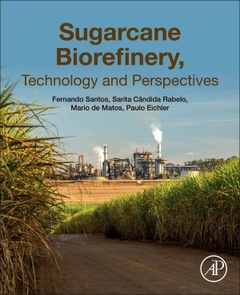Sugarcane Biorefinery, Technology and Perspectives
Coordonnateurs : Santos Fernando, Rabelo Sarita, De Matos Mario, Eichler Paulo

Sugarcane Biorefinery, Technology and Perspectives provides the reader with a current view of the global scenario of sugarcane biorefinery, launching a new expectation on this important crop from a chemical, energy and sustainability point-of-view. The book explores the existing biorefinery platforms that can be used to convert sugarcane to new high value added products. It also addresses one of today's most controversial issues involving energy cane, in addition to the dilemma "sugar cane vs. food vs. the environment", adding even more value in a culture that is already a symbol of case study around the world.
Focusing on the chemical composition of sugarcane, and the production and processes that optimize it for either agricultural or energy use, the book is designed to provide practical insights for current application and inspire the further exploration of options for balancing food and fuel demands.
1. Sugarcane World Scenario 2. Byproducts of the Sugarcane Industry 3. Sugarcane Straw: Recovery and Logistics 4. Sugarcane: Food Production, Energy and Environment 5. Sustainability of Sugarcane for Energy Purposes 6. Energy Cane Breeding 7. Energy from Sugarcane 8. Chemical and Energy Potential of Sugarcane 9. Sugarcane for Renewable Chemistry 10. Use of Sugarcane Vinasse to Biogas, Bioenergy and Biofertilizer Production 11. Production of Second-Generation Ethanol from Sugarcane 12. Biopolymers of Sugarcane 13. Bioelectricity of Sugarcane: A Case Study from Brazil and Perspectives
Researchers, undergraduate and graduate students, professionals from the sugarcane and chemical industry, as well as people interested in the subject of sugarcane biorefinery.
Sarita Cândida Rabelo is an assistant professor at the College of Agricultural Sciences at São Paulo State University (UNESP), Botucatu Campus, Brazil. She holds a M.Sc. (2007) and PhD (2010) in Chemical Engineering from the University of Campinas (UNICAMP), Brazil, with a sandwich PhD period at National Institute of Agronomic Research (INRA), France. She conducted her postdoctoral research at Lund University, Sweden. She was a researcher (2010-2018) and coordinator of the Process Division (2016-2018) at the Brazilian Bioethanol Science and Technology Laboratory (CTBE/CNPEM), Brazil. Her research focuses on the studies of lignocellulosic biomass processing to production of biofuels
- Presents the productive chain of sugarcane and its implications on food production and the environment
- Includes discussions on the evolution of the sustainable development of the sugar-energy sector
- Contextualizes and premises for the technological road mapping of energy-cane
- Provides information on new technologies in the sugar-energy sector
Date de parution : 11-2019
Ouvrage de 304 p.
15x22.8 cm
Thèmes de Sugarcane Biorefinery, Technology and Perspectives :
Mots-clés :
biomass; biofuels; biomaterials; bio-energy; food security; sustainable energy; conservation; sugar-energy sector



